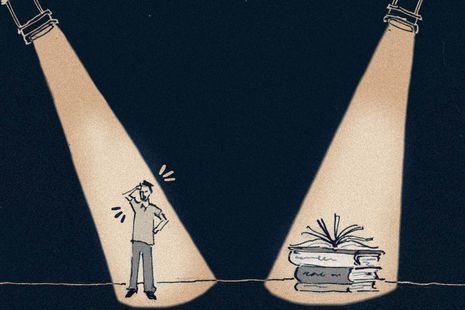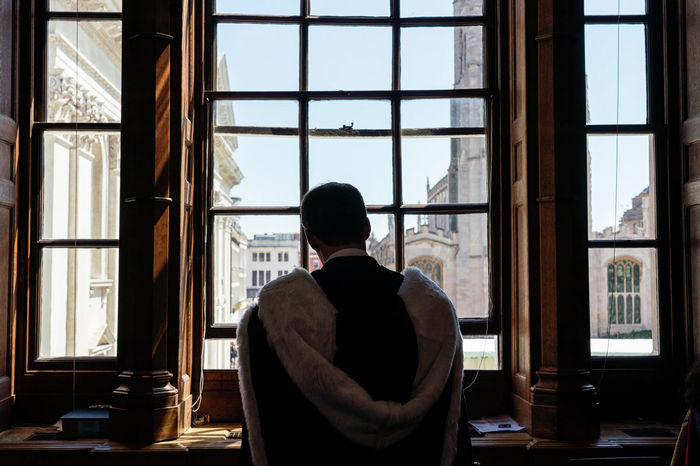What even is a welfare officer?
Ever wondered about applying for one of the most under-discussed roles in CamDram? Kaitlyn Butterly has you covered!

As someone who didn’t have much knowledge of Cambridge’s theatre scene before this term, I’ve always been in awe, and perhaps even in fear, of those who commit themselves repeatedly to the hecticness of student theatre. I’ve watched friends get back from rehearsals at ridiculous hours of the night only to then buckle down to write their weekly essay. It has gotten to the point where I’ve heard so many anecdotes of people sacrificing their sleep and basic self-care to make time for theatre that I now have a sneaking suspicion that doing a show only reinforces Cambridge’s all too familiar mindset of working yourself into the ground.
Like most spaces in Cambridge, theatre has increasingly granted more importance to mental health, with most shows having a welfare officer behind the scenes. Becoming welfare officer for Clare’s May Week production of A Midsummer Night’s Dream made me wonder what exactly a welfare officer is meant to do. Depending on who you talk to, it’s either seen as a vital part of a show’s cast or crew, or it’s seen as that person who you see at the start of rehearsals, only to never see them again. For most, they may be the designated snacks person, and that may be the only way you’ll ever interact with them.
“It can also be hard to know what exactly you’re supposed to do in those situations, other than to do the very British thing of offering someone a chocolate digestive”
This is, of course, not an attack on any welfare officer. After all, welfare officers are also students and have their fair share of work and stress to contend with themselves. It can also be hard to know what exactly you’re supposed to do in those situations, other than to do the very British thing of offering someone a chocolate digestive. That being said, I’ve heard of some notable exceptions who have found innovative ways to keep their fellow cast and crew members sane, which is no easy feat! So, with all that being said, what are some of the main tips and tricks that I’ve come across so far that can help you improve mental health behind the scenes of a show?
- Remember that you can’t do everything!
Whilst this might sound like a slightly depressing start, it can also be very freeing to remind people that they’re human and need balance. It might look like everyone around you is able to juggle a million things whilst you’re struggling to do one, but the reality is that you’ll be much happier and healthier if you take a moment every now and then to recognise that even the most productive people need a break.
- Try other ways of communicating other than face-to-face.
Whilst nothing beats talking to someone in person, sometimes this can be more daunting for people, especially at the start when you’re not yet a familiar face. Offering other options, even if it’s just letting people know that they can message you on WhatsApp instead, will make communication that much easier.
- Try to turn up to as many rehearsals as possible.
Making sure that you’re actually around as much as possible is probably the only actual way that you can make the most of your role. Whilst it’s not necessary to go to everything, being present at rehearsals is one of the easiest ways to check in with everyone, get to know people, and also to see if anyone’s potentially not doing okay. It also means that people become more familiar with you, which is arguably the most important thing!
- Bring the right snacks!
Whilst it might be a stereotype that all welfare officers do is bring snacks, that doesn’t mean it should be completely ignored. After all, sometimes the answer to all of your problems really is as simple as eating a doughnut. As long as you don’t forget the more key aspects of the role, there’s nothing wrong with taking your snack responsibilities just as seriously.
The main thing that I’ve learnt is to really just be a friendly face that people feel comfortable enough to talk to. You don’t have to be a therapist to ask someone how they’re doing and give them a few comforting words or pieces of advice – sometimes that’s more than enough!
And for any of you actors out there who feel stressed about managing your hectic schedules, give yourself credit for balancing everything. Remember that the whole point of student theatre is to enjoy yourself and forget your work for a minute – not to make it more stressful than the work itself – that goes for all of you welfare officers as well!
Want to share your thoughts on this article? Send us a letter to letters@varsity.co.uk or by using this form.
 News / Right-wing billionaire Peter Thiel gives ‘antichrist’ lecture in Cambridge6 February 2026
News / Right-wing billionaire Peter Thiel gives ‘antichrist’ lecture in Cambridge6 February 2026 Features / From fresher to finalist: how have you evolved at Cambridge?10 February 2026
Features / From fresher to finalist: how have you evolved at Cambridge?10 February 2026 Film & TV / Remembering Rob Reiner 11 February 2026
Film & TV / Remembering Rob Reiner 11 February 2026 News / Churchill plans for new Archives Centre building10 February 2026
News / Churchill plans for new Archives Centre building10 February 2026 News / Epstein contacted Cambridge academics about research funding6 February 2026
News / Epstein contacted Cambridge academics about research funding6 February 2026










